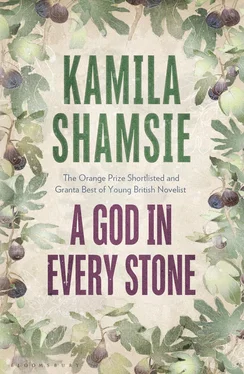— In the temple they argue: should they give themselves up to the Persians or try to flee their homeland? Only one man says nothing: Scylax, who knows the Persians best of all — has travelled with them, drunk with them, and worn Darius’ mark of favour on his brow.
— Stop him!
The words whispered in her ear by Tahsin Bey’s nephew, Mehmet, the archaeologist nearest to her in age but until now distant around her, almost distrustful.
— Please. He’ll listen to you. Please.
The edge of panic in his voice made her act without thinking. Picking up a slice of pear she flicked it towards the pug who leapt from Tahsin Bey’s arms, tiny legs paddling the air as though it were water; the Turk lunged forward, caught her, and somehow managed to regain his balance on the chair to the sounds of applause. It had worked; the mood shifted to the jubilance which accompanies averted disaster, Mehmet called out, A song! A song! and the Germans around the table broke into ‘Greensleeves’, Wilhelm catching hold of Viv’s hands and pulling her into a surprisingly light-footed dance around the table as he sang.
A little later, she apologised to Tahsin Bey. For some reason, I was convinced I could toss the pear directly into Alice’s mouth, she said. He waved away the need for any explanation. Mehmet, sitting near by, watched impassively.
— Why did I really do it? she asked the young man when they were out of everyone’s hearing.
— Oh, I’ve heard that story so many times I’m sick of it, he said, and though she knew he was lying she couldn’t begin to fathom why.
During the second week, her discovery: a fallen slab of stone, which had once been part of the ceiling, was moved away from the rectangular building with Ionic columns and an inscription stone was revealed. It was Viv who’d insisted the foreman ask his men to move the obstructive slab — no one but her took much interest in the small building while there were grander structures to excavate — so she was the only one of the archaeologists present to read the Greek words, step back, read them again, and race down the terrace in search of Tahsin Bey.
— I’ve found it! I’ve found the Temple of Zeus!
Although it was early in the afternoon all the archaeologists broke away from what they were doing to cluster around the inscription stone and toast Viv with the wine which her tent-mate, Gretel, had been saving for A Great Occasion.
— Vivian Rose Spencer, archaeologist! Tahsin Bey said, and the others raised their glasses and echoed the words in their different accents. She wished her father were there to witness it.
Every night Viv placed a bowl of figs beside her camp bed, and fell asleep with her hand resting among the plump fruit. She had always been a fitful sleeper but in Labraunda the hours of physical toil followed by wine meant that she woke in the same position as she had fallen asleep, pulled out of dreams by the snuffling of a pug who knew how to lift up the end of a mosquito net with her teeth and squeeze under. One paw on the rim of the wooden fruit bowl, Alice rocked it this way and that without quite tipping it over. Too well-behaved to cause disorder or too imperious to serve herself, Viv could never decide.
Either way, within minutes of waking Viv, while the other women in the tent slept on, Alice would be tucked under the Englishwoman’s arm, having thin shavings of fig delivered to her mouth just as she liked them. Tahsin Bey would pretend surprise every morning when woman and dog caught up with him as he was walking, very slowly, up the slope.
— Did she wake you? She runs off as soon as I open the tent flap; I’m so sorry. But as you’re awake, would you care to. .?
Viv was increasingly grateful for the pretence as the summer drew on; it allowed her to avoid the question of what she was doing, contriving — with a pug — to have a few minutes of the day alone with Tahsin Bey, sitting on the rock with a fissure created by Zeus’ lightning bolt, drinking a morning cup of tea as the rising sun lifted the ruins of the Sanctuary of Labraunda and the surrounding forested mountains out of shadows. There was a beauty in this piece of the Ottoman Empire which sank down into her as nothing in England ever had — the terraced slopes, the plane trees, the brilliant cloudless blue of the skies, the bones of a temple which she would always and for ever be the first person to have identified. She pressed her palms together, the hard skin and calluses giving her more pleasure than anything else about her body ever had.
One morning near the end of the dig they were sitting together as usual; Tahsin Bey on the rock with one leg folded under his body, the other leg dangling over the edge, elbows tucked in as he held the hot mug of tea near his face. It was a posture she had sketched from memory by the light of the full moon in her calfskin notebook — more private, more precious than all the sketchbooks.
— Are you disappointed that you haven’t found it? she asked, watching him as he looked down towards the Temple.
— Found what?
— What you’ve always hoped to find at Labraunda.
— How do you know. .?
— You told me. The first time we talked properly.
— You were five years old the first time we talked properly. We discussed the spiritual life of dolls.
— Well, all right. The first time I remember us talking properly.
Their voices lowered, teasing, their hands resting side by side on Alice’s fur.
The girl followed the lights, the music and the gabble of voices as they spilled from the door into the garden. As she progressed closer to the edge of the property she realised everything that had preceded her out was being swallowed up by the darkness, so that soon only she would remain. Unless the darkness swallowed her up, too.
— Where are you going?
The darkness didn’t sound as she’d expected; its voice foreign.
— Away from that.
She flicked her hand behind her at the house filled with New Year revellers waiting to cross into 1904. What she really meant was that she wanted to escape from her mother who was attempting to send her to bed as though, at eleven, she was still a child.
The darkness lit a cigarette and a man’s face appeared, attached to the end of the glowing white stick. The girl had known this man all her life but he had only become interesting to her earlier that evening when her father whispered into her ear, ‘He’s an archaeologist who grew up where Herodotus did’. She repeated this fact back to the man, who pulled on his cigarette, his cheeks sucking in until the girl was sure they must have met inside his mouth.
— Yes, the ancient land of Caria, on the cusp of Persia and Greece. Home of Herodotus, the Father of History, it’s true. But before Herodotus there was Scylax — the greatest of the ancient travellers. Now reduced to a speck in the corner of history’s eye.
— He travelled to India! Herodotus writes about him.
The man looked at her as if she had just become a person worthy of interest.
— Yes. It was the least he could do, Herodotus, after he stole all Scylax’ tales of India for his Histories . What do you know of him?
— Only what Herodotus tells us. The Persian emperor Darius sent a group of men he trusted to India including Scylax —
— Especially Scylax! Kai de kai , that’s the emphasising phrase he uses. Especially Scylax. The most trusted. Go on.
— Scylax travelled along the River Indus, and later Darius used the information he brought back to go down the river and conquer India, just as the British have done.
— Learned that last part from Herodotus, did you?
Читать дальше












